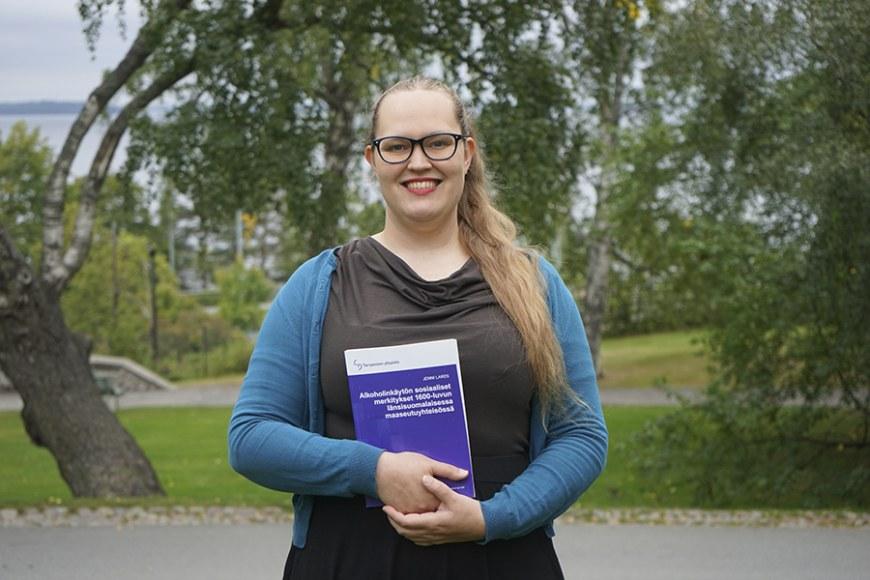
The theoretical frame of the doctoral dissertation of Jenni Lares is formed around cultural and social history, and she uses mainly qualitative methods to analyse the various social meanings of drinking.
She has limited the study to 17th-century rural Western Finland. Public drunkenness was criminalized in Sweden in 1733, so in the research period inebriation was not a punishable act per se.
Lares uses rural lower court records as her main source. Since drinking was not considered illegal in most cases, her sources tell about various court cases where alcohol was discussed. Most of the court cases deal with violence or adultery. There are also several cases regarding debts, thefts, illegal selling of alcohol, and the regulation of taverns. This makes it possible to study the various roles drinking played in different social contexts.
Lares has constructed her study around three main themes: everyday life and feasts, intoxication, and sociability. In early modern Finland, alcohol was consumed as a part of healthy diet, at least in the wealthier households. Light beer was an essential part of daily nutrition for crown’s workers, soldiers and officials alike. Distilled spirits were also consumed daily, if the household could afford it. These everyday drinks could also be used for medicinal purposes.
Drinking was used to signal times of work and leisure, since they both call for different kind of drinking. Intoxication was a vital part of celebration. Heavy drinking on important feasts carried magical meanings of plenty and abundance, which secured the time during and after transition.
Rural population considered court gatherings and church going to be a part of feast, but the officials had a different view on intoxication and celebration. These views collided many times in the early modern period, and from the 17th century onwards the crown put more effort to control drinking.
The concept of intoxication started to change during the 17th century. For most of the century, those who caused disturbance in the courtroom or church were fined because of their disturbance regardless of their drinking. This changed when the Church Law of 1686 was put in use, and officials started to fine churchgoers who admitted to drinking even if they had not caused any disturbance. Lares argues that this was due to new concepts of intoxication and the human body.
Sociability has always been an important part of drinking. People meet their friends for a drink, and “after work” was known to early modern Finns. 17th-century western Finns usually drank with their peers, and even when more people were attending a feast, guests usually sat with someone of their own social standing or close to it. Women usually drank in their own companies, since drinking with men could lead to suspicions of adultery.
Most drunken brawls began by challenging the sociability or honour of other drinkers. Drunken violence can usually be traced to some insult, practices of exclusion, or an old quarrel. Although we only know the versions that were told in the courtroom, Lares argues that meanings of friendship and sociability help to explain drunken violence.
Social meanings of drinking can be interpreted in many different ways, and even the same meanings can be seen from different angles depending on the context, the drinkers and the observer. However, drinking studies give a new perspective on society and its people, and provides a closer look to everyday life, social relations and cultural patterns.
For early modern period, the study of drinking cultures is very fruitful, since alcohol was present in many occasions and was used for various reasons. Although court records and judicial sources tell about disruptions and conflicts in the society, they help to understand different social meanings of early modern drinking.
The doctoral dissertation of M.A. Jenni Lares in the field of history titled Alkoholinkäytön sosiaaliset merkitykset 1600-luvun länsisuomalaisessa maaseutuyhteisössä will be publicly examined in the Faculty of Social Sciences at Tampere University on Saturday 3 October 2020 starting at 12 o'clock in the Main building auditorium A1 in the city centre campus, Kalevantie 4. The Custos will be Associate Professor Anu Lahtinen from University of Helsinki. The Custos will be Professor Raisa Toivo.
Only a limited amount of participants is allowed to the auditorium.
The dissertation can also be seen online:
https://tuni.zoom.us/j/69439158612?pwd=VEtZN05PM05kalVOUXpwNFM1QlVNZz09
Meeting ID: 694 3915 8612, Passcode: 293346
The dissertation is available online at
http://urn.fi/URN:ISBN:978-952-03-1629-7
Photo: Iita Kulmala
